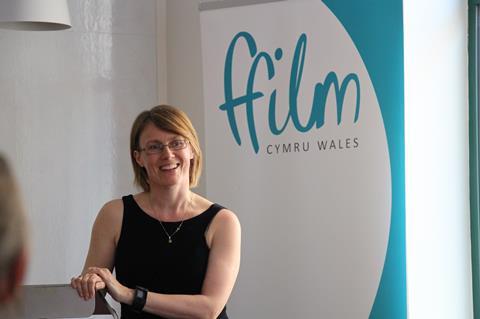
As Welsh film agency Ffilm Cymru prepares to publish its strategic plan for 2024-30, founding CEO Pauline Burt says it is the right time to step down.
“We’re coming into a new strategic planning period, we’ve drafted our plan for 2024-2030. I wanted to leave at a time when an incoming CEO could shape that before it’s published in December,” says Burt.
Producer and board member Uzma Hasan, whose credits include Asif Kapadia’s Creature, will step down from the board and be interim CEO until a permanent appointment is made.
Burt will remain in post until September 15 and is taking some time to figure out her next move. She says she has an interest in working in policy in the creative industries, and may not stay based in Wales.
When she joined the agency 17 years ago, she was the sole employee. (Now Ffilm Cymru has between 20-25 staff.) Burt’s background was in the financial side of the creative industries, working as a risk manager in London. She relocated to Wales to take on the role of chief executive of what was then known as the Film Agency Wales.
The 89 features Ffilm Cymru has supported with a total of £15.8m National Lottery funding in this time include Rungano Nyoni’s Cannes premiere I Am Not A Witch, Prano Bailey-Bond’s Sundance title Censor, Janis Pugh’s Edinburgh opening title Chuck Chuck Baby, and Sally El Hosaini and James Krishna Floyd’s Unicorns, which is premiering at Toronto this month.
Burt talks to Screen ahead of her departure about how to make a limited pot of funding (Ffilm Cymru anticipates a budget of around £5m for the coming year spanning support for development, production, exhibition, skills and training) stretch further; the impact of the SAG-AFTRA strike on Welsh production; and how the UK film industry has a way to go to move away from its London-centric approach.
How has Ffilm Cymru managed to propel local talent onto an international platform with modest resources?
Pauline Burt: We created an environment in which [Welsh writers, directors and producers] could actually do the projects they wanted to do. We didn’t limit them by saying it had to be filmed on your doorstep, or stories that are demonstrably Welsh in nature. We didn’t prescribe what it had to look like in terms of the films they were making. We just created the conditions where they could make films. That’s one of the reasons we had such a high level of international co-production – it’s been about 25-30% per year. We’ve been so flexible, we haven’t said everything has to be local [to qualify for production funding, a project must have Wales born or based talent in the lead writer, producer and/or director].
We didn’t have much money, certainly when we started out. Thinking about how you leverage that, and how you work in collaboration, is in our DNA. Being able to have rules in place that are flexible for working with partners remains very important. We’re hosting CineRegio, the European network of film funders, in October this year in Cardiff, that’s got about 53 members.
How does Ffilm Cymru’s funding model work?
From the beginning, we’ve managed Arts Council Wales lottery money, that’s been a constant. We’ve always had BFI or UK Film Council, depending on who had the remit, in the mix as partners. That’s evolved as they have evolved, so we currently manage BFI Network. We’ve always had one funding stream from the BFI, in one way or another.
Welsh government has an evolving relationship with films. They set up Creative Wales about a month before the first lockdown (2020), we’ve become close partners with Creative Wales and started manging their independent film fund from July of last year. We’re about to launch a Welsh-language fund, which we’ve managed with them. Outside of that, we’ve done project-based funding, for example in the environmental space and looking at skills.
What is Ffilm Cymru’s approach to skills training?
We’ve taken a different approach to skills, as far as I’m aware, to anywhere else in the UK. We’ve partnered with local housing associations, we’ve looked at inclusion from the lens of economic class-based challenges. We’ve been in communities and having a people-centred approach. A lot of the skills strategies around the UK have tended to go – we’ve got a boom, there’s loads of production, we need more people. Then suddenly, there’s not a boom, you don’t need so many people. If you look at unscripted, there’s not enough work.
We looked at people who had never thought about the creative industries as being for them – some of the poorest areas in the northern hemisphere are in Wales. If you stop thinking about the way we normally think about skills in this sector, what works for people if they want to not follow films all around the country all of the time, but be more locally based? We built Foot In The Door as a programme off the back of that, that we’re rolling out with local authorities. It’s okay for those individuals to not be in film and TV all of the time – we’ve got a carpenter who worked on Apostle, Eternal Beauty, he’s done different projects with us. And when he’s not doing these projects, he’s got a painting and decorating business.
Have you seen any impact of the US SAG-AFTRA actors’ strike on Welsh production?
Only a little bit, but I think that’s by chance. HBO House Of The Dragon series was able to carry on, [Cardiff-based] Bad Wolf’s productions were not impacted. We had one feature film that Protagonist Pictures is selling and Good Gate Media is producing, The Man In My Basement [starring Willem Dafoe], and that’s on pause which is really frustrating because it’s fully funded.
Will Ffilm Cymru be administering the BFI National Lottery Skills Clusters Fund for Wales (regional partners now administer skills funding, as opposed to ScreenSkills, who was the partner under the previous funding cycle)?
There isn’t a decision on the Welsh cluster as yet. That’s still in progress and we are in discussion with them.
Do you feel enough has been done to decentralise support for the film industry, outside of London, where lots of funding decisions are made?
No. I can be blunt about it as I’m leaving. It’s heading in the right direction, there has been more emphasis on place-based approach. Clearly the DCMS [UK government’s Department for Culture, Media and Sport] has been pushing that more broadly, if you look at broadcasters moving out [of London], like Channel 4.
I don’t think it has been fully thought through what it means to really decentralise. I think it’s about having more trust in whoever you’re dealing with outside of London – they know their patch, they know what the particular strengths and weaknesses are. I would never assume that Scotland’s solution is the same as ours. Some areas there might be more of a service industry, so there should be a focus on inward investment. Others might have more of a history of storytelling – storytelling is in the DNA of Wales. It’s too easy to be a bit removed from that. I’m not saying it’s lip service, but if you say you’re going to devolve funding – what does it really mean to be devolved? You have to share that decision making. I think we’ve got quite a way to go on that.
What are the principles of the 2024-2030 strategic plan?
We’ve got pillars, which look at skills, environmental sustainability, well-being and creativity, as the drivers of everything. There are a couple of areas we are looking at. One is around the impact and value of project funding versus company level and more flexible funding. We’re also conscious that exhibition is a continued area of support for us. There are mainly independent cinemas across Wales, and as is the same for everywhere else, they’re still only at the 60% and 70% of pre-Covid levels for audiences. We’re trying to think more broadly about if there are things we can do with exhibition as a cohort, rather than everything being about individual awards, and thinking about how the business model should evolve for exhibition.

























No comments yet